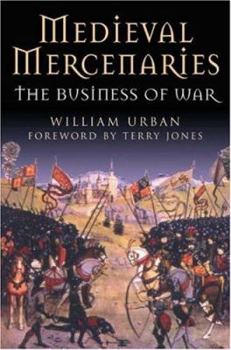Medieval Mercenaries: The Business of War
Select Format
Select Condition 
Book Overview
The Middle Ages were a turbulent and violent time, when the fate of nations was most often decided on the battlefield, and strength of arms was key to acquiring and maintaining power. Feudal oaths and... This description may be from another edition of this product.
Format:Hardcover
Language:English
ISBN:1853676977
ISBN13:9781853676970
Release Date:December 2006
Publisher:Greenhill Books
Length:304 Pages
Weight:1.40 lbs.
Dimensions:1.1" x 6.4" x 9.4"
Customer Reviews
1 rating
not just military history
Published by Thriftbooks.com User , 16 years ago
William Urban's trek into the world of medieval mercenaries, Medieval Mercenaries: the Business of War, is extremely interesting. Urban mixes historical fact from reputable sources with popular literature to create a better understanding of the mercenary in the tenth through sixteenth centuries. Mercenaries participated in every major and most minor conflicts of the medieval period. A mercenary is a professional soldier who enters into a conflict not for nationalism, but for profit. Urban discusses the intricacies, hazards, and profits of the mercenary soldier. Urban kicks off his investigation with the Vikings, referred to as the Varangian Guards by the Byzantines, defending the imperial interests at Constantinople. Through their activities, the Varangian Guard helped Harold Hardrada, previously the King of Norway and at the time the commander of the Varangian Guard, gain a reputation as a powerful general. Hardrada had come to Byzantium to seek protection from rebels who had killed his half-brother. The Byzantine emperor employed him in the Varangian Guard, eventually promoting him to commander. This time spent in the employ of the Byzantine emperor and the reputation earned there helped Hardrada regain his throne in Norway. The activities of the Vikings and the Varangian Guard in Byzantium are followed by the stories of William the Conqueror, Friedrich II, Edward II and III, Charles the Bold, a host of popes and too many would-be kings to name. These stories fill the pages with their quests for power, glory, and greed. At their service are thousands of mercenaries looking to get rich or die trying. Urban gives extra focus to several medieval heroes and villains, most notably John Hawkwood. Hawkwood's humble beginnings and adventuresome spirit lead him to become one of the most notable mercenaries of the time. Hawkwood and his troop venture through Italy, working for popes and quarrelling noble families, fighting Greeks, Arabs, Italians, and other mercenary groups. Urban does a good job of illustrating how Hawkwood paid, hired, and deployed his mercenary forces, as well as how he dealt with difficult employers. The business of war is a difficult one. Money runs out. Mercenaries switch sides mid-fight. Peace means unemployment. During the Hundred Years' War, mercenaries came to dominate the battlefield and were employed to supplement the feudal forces. However, during times of peace, they could turn on their employers and start a new conflict. Therefore, it was in the interest of all professionals to keep the wars as long and bloodless as could be managed. The free companies of mercenaries operated all over Europe and were for hire to anyone who could afford them. The White Company, the Black Company, the Teutonic Knights, and other military organizations operated as standing armies without a nation. These groups did not have to look far to find a fight. Rivalry between kings and religious sects kept the free compani




